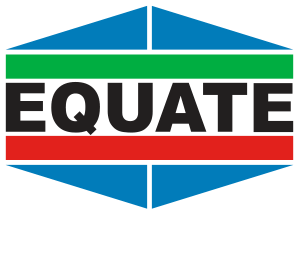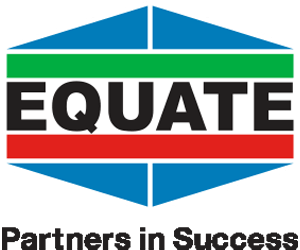Date/Time
Date(s) - 14 April 2009
12:00 am
Categories No Categories
Al-Qabas interviews EQUATE President & CEO
1. How was the petrochemical industry effected by the global economic crunch?
All industries were effected by this crunch, yet the impact was not direct in comparison with other sectors, such as stock exchanges and real estate. The crisis started emerging last August as oil prices began declining and that in turn affected price of naphtha used in producing ethylene which is the petrochemical industry’s main feedstock. That caused an increase in supplies with a decrease in demand on consumer goods due to the crunch, leading to a drop in the demand for petrochemicals that play an instrumental role in providing raw material to many downstream industries. The drop in ethylene prices was 50-60% with prices going down from USD 1800 to USD 700 during September to December, 2008.
The average drop in global demand was 20-30%, while Asia witnessed a 15-20% decrease. Most of EQUATE’s sales are directed to the Asian market with the rest going to the Middle East, Europe and Africa.
The mergence of a crisis is the best time to asses a company’s strength. Powerful companies should be able to adapt with all circumstances, which means operating, selling, marketing and making profit both during recession and prosperity without having to shut down plant units or decrease production. This is EQUATE’s case, it continued usual production and sales without any difficulties.
2. Why wasn’t the petrochemical industry greatly impacted by the hike in oil prices in comparison with the drop?
The petrochemical industry is mainly effected by the level of supply and demand, which is relevant to consumption, not oil prices. Petrochemicals are raw material used in downstream industries for cars, electrical equipment, fibers, plastics and other applications.
Due to the economic crunch which was escalated by the fall of oil prices, there was a drop in demand for these products and many plants had to reduce production, especially the car industry which had a major decrease in sales. This in turn led to reducing demand and prices of petrochemicals.
In addition, China, which is one of the world’s biggest polyester importers, reduced its production due to the lack of demand from its main consumers in Europe and the United States, which greatly affected international demand and dropped prices. In brief, it’s all a chain of events that affected prices, demand and production.
3. However, how did EQUATE sustain its production levels while there was a drop in demand?
This is true, EQUATE did not reduce its production despite the decreased demand in Asian markets which is our main market. EQUATE’s diverse marketing strategy enabled it to compensate the demand shortage in Asia by heading to other markets, such as Africa where we increased our stake. Building trust with new customers is very challenging because of the current crisis that hindered many businesses. EQUATE took its own measures to adapt with the crunch and any market price, as well as managing cost without dismissing any Kuwaiti or non-Kuwaiti employee while reducing expenditure on administrative affairs and business trips.
4. When do you think the petrochemical industry’s crunch will end?
On the sidelines of the 3rd Annual Gulf Petrochemicals and Chemicals Producers Association (GPCA) Forum in Dubai last December, Chemical Week magazine organized a CEO level round table with the participation of many petrochemical companies. Some participants expected markets to recover by Q3 of 2009, while conservative views said it will only take place in mid-2010. I believe that this crunch will end by the beginning of 2010 as there are positive developments since last January with prices increasing USD 20-50 every month. Polyethylene increased from USD 800 to almost USD 1000 per ton while Ethylene Glycol went from USD 450 to USD 600 a ton. This is a good thing that happened due to a number of factors, mainly the consumers not having much stock because of previous soaring prices. Moreover, many consumers expected another drop in prices, so they did not build up their inventory supplies which led to increasing demand. In addition, for the first time there was an increase in China’s demand for petrochemicals after the Chinese new year in February, that meant there was no stock in Asia gave quite a strong boost to demand. Other reasons for the balance in supplies are probably relevant to postponing the startup of new plants, such as SABIC’s and Petro Rabigh’s.
5. Is there a relation between the projects of Kuwait national Petroleum Company (KNPC) and the growth of Kuwait’s petrochemical industry?
Many persons have asked us: “Was EQUATE affected by cancelling the 4th refinery project?” The answer is yes, Kuwait is a country that consumes electrical energy which comes from nuclear power, fuel gas or gas. So far Kuwait does not have any resources that supply electricity without fear from any shortages during summer time. Gas remains a main source for electricity. Kuwait Petroleum Corporation (KPC) only supplies gas to operate EQUATE’s plants without any surplus EQUATE could buy and boost its production capacities. Thus, cancelling the 4th refinery has restricted EQUATE’s ability to expand its production levels.
The 4th refinery could have provided fuel oil for electrical power stations and many industries to be established or looking forward to expand.
One thing I’d like to add: Is there currently any project in Kuwait that can provide over 600 jobs to Kuwaiti youth? So far, there is none, the last project which did that was the Olefins II Kuwait (OL2K) program. The 4th refinery would have provided this number of jobs in less than 10 years. We really hope this project will be reconsidered as brought up by some reports.
In addition, we must understand that there’s no economic feasibility from using gas in electrical generation with the availability of other alternatives. Greater return can be achieved from selling gas to plants than providing it to consumers at subsidized prices. This leads to boosting Kuwait’s economy and varying income sources through creating added-value for feedstock, achieving sales profits, as well as expanding the capacity of plants.
6. What are your future projects?
So far, there’s nothing specific, but we have many plans. As for EQUATE III, the decision is in the hands of Petrochemical Industries company (PIC) as EQUATE has no right to launch investments, it only handles planning and research, as well as operating and marketing. All Kuwait’s petrochemical projects rely on the availability of gas and once it’s available, projects of EQUATE’s scale can be established.
7. How do you feel about Kuwait’s reaction to the economic crunch, especially after cancelling K-Dow?
I don’t see Kuwait playing an instrumental role in this crisis, while other countries have seized the opportunity by acquiring and buying companies and plants that are looking for funds. The Gulf has enough cash flow to expand globally and utilize its wealth. For example, despite not having Kuwait’s expertise and abilities, with all due respect, Abu Dhabi continues buying and acquiring plants, refineries and international companies.
As for K-Dow, it was better to re-negotiate the deal based on the drop in prices, not resort to terminating it. The deal would have provided Kuwait with international export outlets and contributed to solving the dilemma of local petrochemical producers having to rely only on plants in Kuwait. K-Dow was planned to produce 8.5 million tons annually of export polyethylene and propylene, that’s about 20 times more than Kuwait’s current annual production.
Currently there’s an opportunity for Kuwait to boost its production capacity. For instance, EQUATE exports 60% of its output to Asian markets, if we buy a plant there, we can direct a good portion of our products to Europe or other markets that we don’t have enough products to export to them. This will increase Kuwait’s income and vary its sources.
Now is the right time to invest abroad because the value of assets have greatly decreased until the end of this year. I wonder why Kuwait is not investing right now? Will we only invest after prices double?
I would like to call on decision makers to increase foreign investments through Kuwait Investment Authority (KIA) and KPC. Some of the world’s best plants are up for sale and many are in need for cash which we have and we can get prime prices right now and petrochemical investments are for the long term.
8. What is hindering the oil sector’s growth?
I wish KPC would get autonomy from the Ministry of Oil to avoid politicization. This would enable it to operate as an independent commercial entity. A noteworthy example is SABIC which is 30% owned by private and individual investors with the remaining 70% held by the Saudi government which provides the company with necessary feedstock and allows it to function with utmost independence.
KPC can’t function properly without enough authorization and being evaluated based on results. It needs the proper environment provided by the government to KIA and the Public Institute for Social Security (PIFSS) which are 100% state-owned and operate on commercial basis.
While it should grant the private sector a greater role, KPC has many opportunities to invest in Kuwait before heading abroad, yet its autonomy is greatly challenged. I recall what was said to me by a former KPC CEO who noted “Before approving the execution of any project, I need to go through 30 steps.” Here at EQUATE, we only need three steps.
9. What are your expectations for EQUATE’s 2009 profits?
I think they will be lower than 2008, not only for EQUATE, but also all companies because the market’s size has shrunk in comparison with before. In addition, although prices have relatively improved contrast to some expectations, prices are not expected to surpass last year’s. Personally, I’m optimistic because prices are better than this year’s forecast.
10. What’s the secret behind EQUATE’s success?
EQUATE’s combination has made it one of the Gulf’s best companies that are currently competing with international counterparts. When EQUATE was established, the best human resources capable of working under all circumstances were hired. EQUATE did not stop production during Iraq’s liberation war, did not have breakdowns witnessed at the world’ biggest plants and for three years we did not have a single employee take a Day Away from Work Case (DAWC) due to a work-related injury. EQUATE is also known for its professional selectiveness in recruitment, we look for dedicated and distinguished persons. In addition, EQUATE maintains its production costs to ensure best profits for shareholders.
11. Will this year witness the startup of any plants?
As part of EQUATE II, we have three plants: the styrene plant will kick off during Q2 with a capacity of 450,000 metric tons annually (MTA), the polyethylene expansion with a capacity of 250,000 MTA will startup during Q3, as well as the Aromatics complex expected to start during Q3 with a capacity of over 700,000 MTA. All projects are going according to plan.
12. Do you have any concerns over the startup of many plants in the Gulf and creating a supply surplus?
No concerns at all, there are many plants in Europe and the United Sates that were shutdown, the current plants can’t meet the supply and demand over there. These countries will rely on Gulf plants that provide lower prices due to feedstock availability. As the petrochemical industry is a measure of economic growth, more plants might be needed after the upturn of the international economic situation, especially when the growth rates of developing countries return to normal.
Source: Al-Qabas Newspaper – Page 44
Editor: Mai Maamoun
Date: April 14, 2009
The interview’s original Arabic can be obtained from here:

